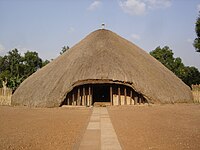Kasubi Tombs: Difference between revisions
→Tombs: Paste tense |
it is still the burial grounds, not past tense |
||
| Line 13: | Line 13: | ||
| Link = http://whc.unesco.org/en/list/1022 |
| Link = http://whc.unesco.org/en/list/1022 |
||
}} |
}} |
||
'''Kasubi Tombs''' in [[Kampala]], [[Uganda]], |
'''Kasubi Tombs''' in [[Kampala]], [[Uganda]], is the burial grounds for four previous [[Kabaka of Buganda|kabakas]] (kings of [[Buganda]]), and a [[UNESCO World Heritage Site]]. On 16 March 2010, the tombs were set alight and almost completely destroyed. |
||
==Tombs== |
==Tombs== |
||
Revision as of 19:19, 17 March 2010
| UNESCO World Heritage Site | |
|---|---|
 | |
| Criteria | Cultural: i, iii, iv, vi |
| Reference | 1022 |
| Inscription | 2001 (25th Session) |
| Coordinates | 0°19′45″N 32°33′12″E / 0.32917°N 32.55333°E |
Kasubi Tombs in Kampala, Uganda, is the burial grounds for four previous kabakas (kings of Buganda), and a UNESCO World Heritage Site. On 16 March 2010, the tombs were set alight and almost completely destroyed.
Tombs
The royal enclosure at Kasubi Hill was first built in 1881. Also known as the Ssekabaka's Tombs, these are the royal tombs where four previous kabakas are buried. The tombs, which were a major tourist attraction, were held in straw thatched buildings and they remain an important spiritual and political site for the Baganda people.[1][2] The tombs were declared a UNESCO World Heritage Site in 2001.[2]
The kabakas buried at the site are:
- Mutesa I (1835–1884)
- Mwanga II (1867–1903)
- Daudi Chwa II (1896–1939)
- Sir Edward Mutesa II (1924–1969).
Destruction
On 16 March 2010, at about 8.30 pm local time, the Kasubi tombs were set ablaze and almost completely destroyed.[3] The cause of the fire is as yet unknown. The Buganda kingdom has promised to conduct independent investigations into the fire, alongside the national police force.[3]
The kingdom is in mourning, there are no words to describe the loss occasioned by this most callous act.
— John Walusimbi, Prime minister of the Buganda kingdom, The Guardian[4]
On 17 March 2010, the Kabaka of Buganda, Ronald Muwenda Mutebi II, and the President of Uganda, Yoweri Museveni, visited the site of the tombs.[5][6] Museveni has said that the government will assist in restoring the tombs.[7] Hundreds of people have also travelled to the site to help salvage any remains.[6] During the President's visit, riots broke out. In order to control the situation, security forces shot dead two rioters and five were reported to be injured.[8] The Ugandan soldiers and police also clashed with rioters in the capital city, Kampala. Forces used tear gas to disperse rioters of the Baganda ethnic group in order to restore normalcy.[9]
The destruction came on the heels of an awkward relationship between the government of Uganda and the Buganda kingdom, particularly in light of the September 2009 riots.[3] Ahead of these riots, the king of Buganda Ronald Mutebi Mwenda was stopped from touring parts of his Kingdom, and several journalists who were allegedly sympathetic to the Kingdom and the rioters were arrested and are awaiting trial.
References
- ^ "Kasubi Tombs website". Kasubitombs.org. Retrieved 17 March 2010.
- ^ a b "Uganda army deploys after fire destroys historic tombs". AFP. Retrieved 17 March 2010.
- ^ a b c "Uganda's Kasubi royal tombs gutted by fire". BBC News. 17 March 2010. Retrieved 17 March 2010.
- ^ "Three killed in Kampala clashes after royal mausoleum destroyed by fire". The Guardian. Retrieved 17 March 2010.
- ^ "Kabaka Mutebi II visits Kasubi tombs". The New Vision. 17 March 2010. Retrieved 17 March 2010.
- ^ a b "Kabaka, Museveni, Besigye visit burnt Kasubi tombs". Daily Monitor. 17 March 2010. Retrieved 17 March 2010.
- ^ "Government to help restore Kasubi tombs". Uganda Media Centre. 17 March 2010. Retrieved 17 March 2010.
- ^ "'Two dead' in protests after Uganda tomb fire". AFP. Retrieved 17 March 2010.
- ^ "Riots after fire guts Uganda tombs". Al Jazeera. Retrieved 17 March 2010.
External links
- Tombs of Buganda Kings at Kasubi, UNESCO World Heritage Centre
- Kasubi Tombs
- Fire Destroys Kasubi Tombs, Uganda Daily Monitor, 17 March 2010

